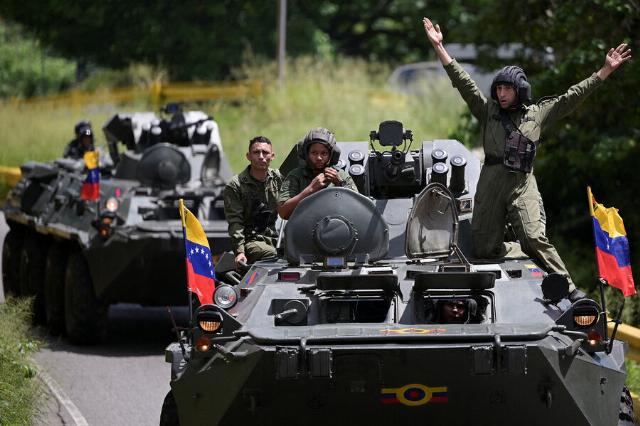Colonel Khodarenok: The United States can capture Venezuela in a few weeks
The US military is ready to launch an operation to seize a number of facilities in Venezuela as part of the fight against drug cartels, the Washington Examiner newspaper writes. Whether this can lead to a full-scale war, how long it will take the United States to capture the entire country, and what does it have to do with it, is described in the material of the military observer of Gazeta.Ru", retired Colonel Mikhail Khodarenka.
The Donald Trump administration views Venezuelan President Nicolas Maduro as the de facto boss of two major organized crime groups responsible for drug smuggling and violence in the United States. These groups are the "Cartel of the Suns" and the organization "Tren de Aragua".
Therefore, the White House has ordered the US Armed Forces to plan attacks on drug cartel-related facilities in Venezuela. It is generally accepted that any such actions will involve lightning operations against specific targets, rather than attempts to take over the country.
At the same time, the Washington Examiner notes that "the buildup of the US armed forces is more extensive than is required for such operations."
But first, let's figure out what the operation means to seize a number of facilities in Venezuela as part of the fight against drug cartels. At first glance, "seizing a number of facilities" does not seem to mean "aggression" or "invasion", and the words "as part of the fight against drug cartels" are roughly consonant with the term "special operation". This is exactly how the situation in Washington is interpreted. According to the official version of the White House, the purpose of such events is to combat drug trafficking.
The balance of power
Currently, numerous US Navy warships, 10 F-35 fighter jets, the 22nd Marine Expeditionary Unit (2,200 Marines and Harrier jets) and a submarine are deployed off the coast of Venezuela. Puerto Rico, located just 900 km north of the Venezuelan capital Caracas, serves as a transit point for such a deployment.
However, such actions on the part of Washington may not result in targeted strikes against drug cartel facilities in Venezuela, but may lead to a full-fledged large-scale war with an independent and sovereign state.
And that's exactly how they assess the situation in Caracas. Against the background of recent events, Venezuelan President Nicolas Maduro announced a general conscription into the Bolivarian National Militia, declaring his readiness to put 4.5 million militias under arms.
The table of the ratio of forces and means should not even be given in this case. The superiority of the United States in all positions is simply absolute.
Guerrilla warfare
But in this case, a lot of questions arise, and the most important of them is what happens next? Has Washington calculated all the options for the development of the situation in Venezuela, and the most unfavorable ones? Won't the United States end up doing the same as it did in Libya, Iraq, and Afghanistan? And won't the United States get a nationwide guerrilla war on the part of the Venezuelan people (and the terrain and vegetation of the country make it possible to deploy such actions)?
Obviously, there are no clear answers to these questions in the administration of Donald Trump. Therefore, the Pentagon is currently limited to maneuvering all formations of the fleet and marines near the coast of Venezuela.
So how the small victorious war in Latin America will end is not entirely obvious to Washington analysts and forecasters. And a resounding loss in such a campaign could deal more than a serious blow to Donald Trump's reputation as Commander-in-Chief (in this case, obvious questions will arise for the head of the White House as a commander) and significantly worsen his position both within America itself and in the international arena.
The opinion of the author may not coincide with the position of the editorial board.
Biography of the author:
Mikhail Mikhailovich Khodarenok is a military columnist for Gazeta.Ru", retired colonel.
He graduated from the Minsk Higher Engineering Anti-Aircraft Missile School (1976), the Military Air Defense Command Academy (1986).
Commander of the S-75 anti-aircraft missile division (1980-1983).
Deputy commander of the anti-aircraft missile regiment (1986-1988).
Senior Officer of the General Staff of the Air Defense Forces (1988-1992).
Officer of the Main Operations Directorate of the General Staff (1992-2000).
Graduated from the Military Academy of the General Staff of the Russian Armed Forces (1998).
Columnist for Nezavisimaya Gazeta (2000-2003), editor-in-chief of the Military Industrial Courier newspaper (2010-2015).
Mikhail Khodarenok

